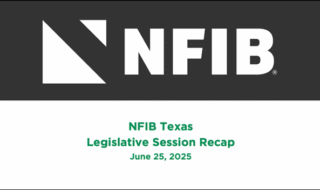March 1, 2025
Health care “fig leaf” removed from workers’ compensation bill
State Director Patrick Connor reports from Olympia on the small business agenda after Week 7 of the legislative session
Friday, February 28, marked another legislative deadline, the first fiscal cut-off. The House Appropriations and Senate Ways & Means committees are holding marathon executive sessions, considering amendments and voting to determine the fate of 27 House bills and 49 Senate bills, respectively.
Among those are two bills of particular concern to NFIB and Washington’s small business owners. Both are pending before Senate Ways & Means:
— SB 5041, Concerning unemployment insurance benefits for striking or locked-out workers.
NFIB testified opposed earlier this week. The bill and the Employment Security Department (ESD) came under fire from minority Republicans who asked several questions about the agency’s revised fiscal note that used strike data from New Jersey, one of only two states that have this law on their books, and cherry-picked Washington state data to cobble together a cost estimate minimizing any potential impact to the Unemployment Trust fund or taxes paid by employers. Our testimony noted the inevitable cost shift to small employers if the workforce of a large employer already at or near UI Rate Class 40 goes on an extended strike, or that employer leaves the state, or ceases operations. In each of those instances, the social tax component would kick in, resulting in a rate hike for all of the state’s remaining employers.
— SB 5548, Concerning workers’ compensation benefits
The measure was slated for approval during Friday’s meeting. This bill was originally sold as an effort to ensure injured workers and their families could maintain health insurance coverage until returning to work, and included an adjustment in the calculations the Department of Labor & Industries uses to determine what percentage of wage replacement applies based on the injured worker’s marital status and number of dependents. The health care fig leaf was quickly jettisoned due to the bill’s $376 million price tag over five years. Both SB 5548, and its companion, HB 1788, have been narrowed to an as-yet-undetermined hundred-plus million dollar increase in workers’ compensation benefits. Bigger payouts to injured workers means even higher-than-normal rate increases for all Washington employers and workers in coming years. HB 1788 passed House Appropriations on Thursday (February 27). NFIB testified opposed to the bills in both committees this week.
Last week’s policy committee cut-off saw 45 bills were we tracking move into the presumed “dead” column. Several were bills that died in one chamber, but whose companion bill survived in the other.
Week in Review
In addition to SB 5041 and SB 5548/HB 1788 above, NFIB also testified on another bill and coordinated coalition letters to key lawmakers on a couple priority issues.
— SB 5626, Wage replacement for workers excluded from unemployment insurance.
The bill would effectively create an unemployment insurance (UI) benefit for individuals not legally eligible to work in the United States, who are prohibited from receiving UI under federal law. To skirt this prohibition, the program would be run by a private third-party administrator (TPA) selected by the department. TPA activities would be shielded from the public records act. Proponents claim there would be no added cost to employers, a laughable and wholly untruthful assertion. To pay for the scheme, the bill reduces a tax that pays for some ESD administrative costs from 0.02% to 0.01% for the first two years, but then allows the department to raise that tax to 0.08% at its discretion to fund benefits for these workers — quadruple the current rate. Somehow, the TPA would award benefits based on information submitted by the worker demonstrating they were employed, but no longer are. The TPA would be barred from contacting the alleged employer to verify work history, earnings, or employment status. Whatever “records” are received from an applicant would be destroyed within 15 days. As questions from several Republicans on the panel revealed, there would be no audit trail, no way to detect fraudulent applications, no way to verify funds sent to the TPA were properly spent, or that subsequent rate increases are necessary to operate the program.
— HB 1213, Expanding protections for workers in the state paid family and medical leave program.
This bill would require all employers, regardless of size, to provide job protection and maintain health insurance coverage for all employees taking Paid Family or Medical Leave (PFML). The bill would also allow workers to take leave in four-hour increments rather than eight as required under current law. According to the latest of an astounding six partial fiscal notes generated for the bill thus far, HB 1213 would substantially increase payouts, growing over time. For instance, ESD expects a $43 million additional cost in 2027, the first full year of implementation, rising to $176 million in 2029, and $360 million in 2031. Yet proponents disingenuously claim no increase in the tax rate would result. That’s because the 1.2% of payroll statutory cap would be hit in 2017. To keep the system in the black, the Legislature would need to either raise the cap or transfer money from the general fund or other sources to backfill the program deficit. Inexplicably, AWB wrote to appropriators pledging neutrality on the bill if two amendments are adopted. One would require 180 days of employment before a worker can take job-protected leave, up from 90 days in the bill as introduced, and an allowance for employers to provide workers notices about the expiration of job protections based on estimates provided from certain sources. In response, NFIB and a dozen other business groups sent a joint letter to committee members reinforcing our opposition to the bill with or without amendments. Nonetheless, committee Democrats extolled the (imaginary) heavily negotiated agreement reached with the business community on the bill and passed it onward to Rules for scheduling a House vote.
— HB 1483 and SB 5423, Right to Repair digital electronic devices
NFIB is also coordinating a letter on behalf of nearly 30 organizations and 60 independent repair shops asking House leadership to schedule a floor vote on HB 1483 as soon as possible. A similar request will be made of Senate leadership. Both bills were previously approved by their respective policy committee. The House bill has cleared the Rules Committee and is eligible for a vote as soon as Monday (March 3). The Senate version is still in that chamber’s Rules Committee awaiting action. Right to Repair remains a priority “do pass” issue for NFIB and its members.
The Week Ahead
Next week, both chambers begin daily floor sessions ending on Wednesday, March 12, the House of Origin cut-off deadline. Very little advance notice is typically given about which bills will be scheduled for votes on any given day. We will do our best to reach out to you for help contacting your legislators as priority bills come up. Quick responses are needed to maximize the impact of the Voice of Small Business on these deliberations. Stay tuned!
Past Weekly Reports
— February 21: Minimum Wage Bills Dead For Now
— February 15: NFIB Members Turn Out in Force to Oppose Minimum Wage Bill
— February 8: Minimum Wage Bills Coming Up for First Hearings
— January 31: Entrepreneurs called on to testify on upcoming legislation by signing-in
— January 25: NFIB Testifies Against Giving Striking Workers Unemployment Benefits
— January 18: Washington State Legislature Begins 2025 Session
NFIB is a member-driven organization advocating on behalf of small and independent businesses nationwide.
Related Articles














